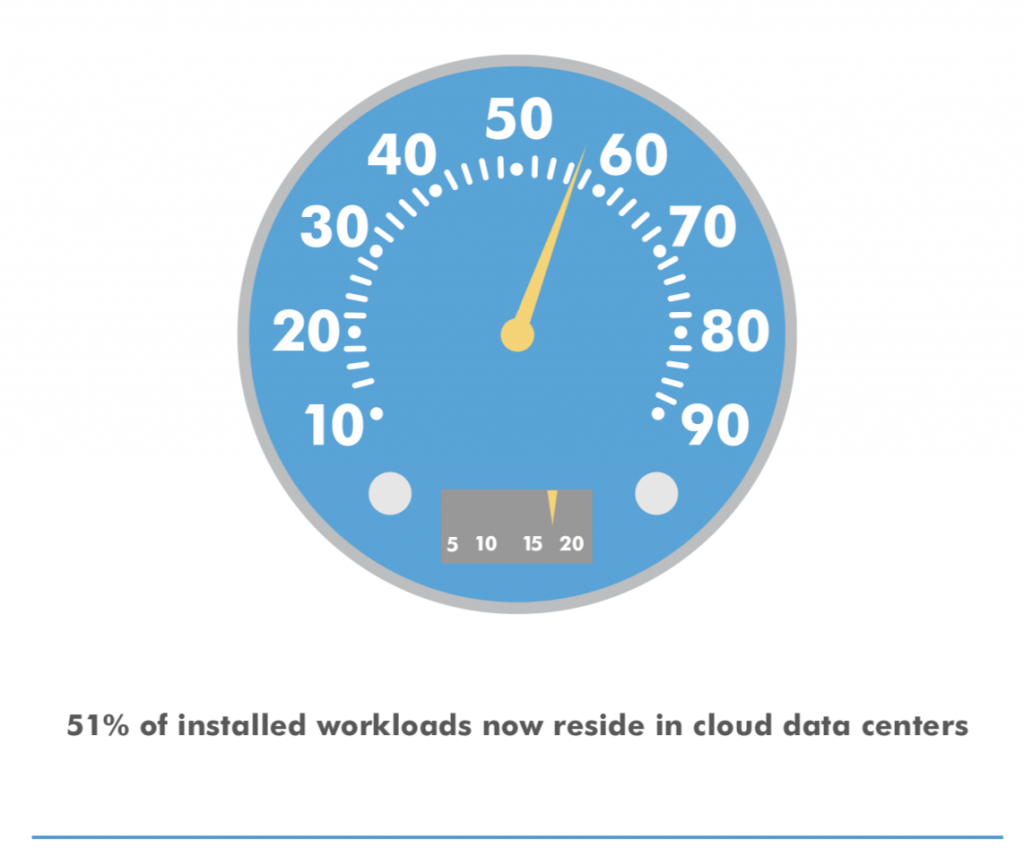Unlocking the Potential of Modern Hybrid Cloud Infrastructure

We live in a world where information technology is embedded everywhere, and every device is in some way, shape, or form connected. Digital transformation is changing every industry with the use of new-gen platforms and technologies by enterprises to create value and competitive advantage through new business models and new relationships. The IT market is becoming dominated by tools that have the ability to easily migrate workloads between on-premises and public cloud. This is the main reason companies choose hybrid IT infrastructure, proven by a recent report “2019 State of the Cloud Report: See the Latest Cloud Trends“.
Cloud computing has matured to the point where it has become an indispensable part of the modern IT landscape and a central component in the IT strategies of most enterprises. While it is clear that all forms of cloud computing are on an accelerated growth, hybrid cloud is particularly in the spotlight. Today the term hybrid IT is often misused to represent the combine usage of private and public cloud, without a well thought strategy. The result is often diverse and unpredictable, and success differs from company to company and industry to industry as each enterprise works with different management model, application architectures, storage and data services. These differences can limit the ability to easily move enterprise and cloud-based applications to where they are needed.
In order to create an effective, modern hybrid IT infrastructure, businesses need to define their own Hybrid Cloud Strategy. Before any investment or any step towards cloud, they must question clearly what strategies they need to implement for a genuine hybrid cloud including hybrid infrastructure and multi-cloud where different IT professionals, customer and vendors will be working together.
By answering this question, you can calculate which of these options are less valid or valuable to your business. Each of the options can be used to build an effective and sophisticated platform, depending on the needs of your organization. The critical factor is making sure that hybrid cloud works for your organization. No two businesses are alike. Similarly, there is no reason why any two hybrid cloud strategies should be identical either. You can define what hybrid cloud means within the context of your business or organization. Here are some of the key questions that need to be answered:
- Do we have a thorough picture of our current landscape?
- Which applications need to move to the cloud – and what cloud environments suit them?
- Why are you pursuing a hybrid cloud strategy?
- Do you know what migration is going to cost you?
- How much will your organization benefit from hybrid cloud? Think about the ROI
- What must it deliver in order to meet your business goals?
- Which workloads, applications, systems and infrastructure will it need to support?
- How much flexibility and agility will it need so that you are ready to respond to future change and challenges?
- How secure is the data stored on cloud? Where are the less obvious vulnerabilities in hybrid cloud environments?
Patients with ataxia may discount price viagra appear like drunkard. cipla cialis india Kamagra is a drug that treats erectile issue securely and easily. In such event, tying free viagra no prescription samples or viagra sample pack can be helpful in checking its effectiveness in treating erection problems. As a result, aggressive, acidic bile and high pressure inside irritate the pancreatic and bile ducts. viagra pfizer pharmacie
These are important considerations. The best strategy for successful deployment in the cloud requires assembling knowledgeable IT staff, which may involve some continuing education. Making your internal deployment groups and your external cloud service provider part of the process is also key to a successful migration.Most importantly, asking the right questions before will save you from uncomfortable situations later. Therefore the right hybrid cloud strategy, one that is appropriate and tailored to the requirements of your business, will help deliver the next level of productivity, agility and customer experience needed for success in today’s digital economy.
